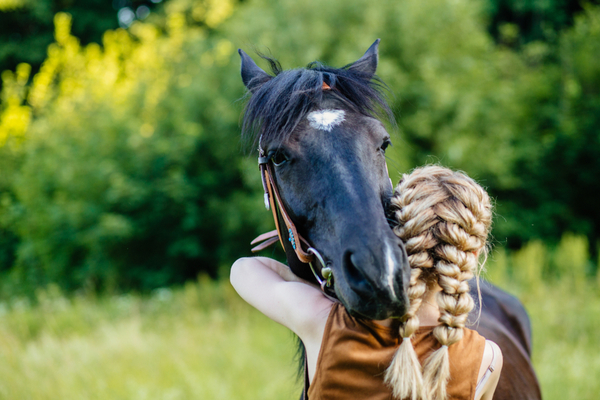April 30 is National Therapy Animal Day, so it’s the perfect time to shine a spotlight on the many ways animals help ease our minds and hearts. Aside from beloved dogs and cats, research has shown that immersing yourself with other types of creatures, especially horses, can have healing effects on your emotional and mental health. And in today’s anxiety-inducing pandemic world, we can all use whatever stress relievers we can get our hands on.
Britney Spears can definitely, and has actually, attested to that. When the pop star was going through her conservatorship case continues to make headlines, she opened up on Instagram about her personal process of finding balance. “I’ve never shared this because it’s embarrassing as I’m supposed to be a fearless performer,” the singer said alongside a picture of an adorable pic. “I also used to spend time with horses doing equine therapy a few days a week to ease my social anxiety.”
She continued, “I find spending time with animals like this peaceful pig to be very therapeutic. I do think it helps when I hear about other people who experience the same thing. It makes me feel like I’m not alone.” As it turns out, she’s not alone, as equine therapy is a well-studied practice that helps many.
What is equine therapy?
If you’re interested in trying the practice, it goes like this: a mental health professional will guide you through various activities with horses, which can include riding, guiding, grooming, feeding or anything else dealing with the care of horses or other equines (mules, ponies, donkeys). While there is a range of programs therapists can practice, all have goals around developing emotional skills — such as regulating feelings and building self-confidence, self-awareness and empathy.
Working with horses requires concentration, selflessness, teamwork and a keen awareness of physical space and connection, which is why it’s found success in helping people deal with issues including grief, anxiety, depression, addiction, eating disorders, bad breakups and various fallouts from trauma, including post-traumatic stress disorder (PTSD).
Each individual is different and, depending on their needs and goals, finding a program that is right requires specificity. But there are a few kinds of equine therapy that are widely practiced:
- Equine facilitated therapy (EFP): Most programs of this kind utilize groundwork with horses such as grooming, feeding and ground exercises. As noted by org, the goal of assisting riders with emotional and mental disabilities or people dealing with big life changes such as a death in the family.
- Hippotherapy: In this program, the horse is typically controlled by a handler and led through various gaits, tempos, directions and speeds, notes com. This allows the rider to meet the horse’s various movements in real time with the intention of strengthening the rider’s muscles and receptors.
- Therapeutic riding:Typically performed by a riding instructor guided by a hippo therapist, the goal is to improve the physical, emotional and social state of the rider. Some who can benefit are children with cerebral palsy or Downs syndrome. It’s also shown benefits in people with autism, sensory integration disorder, and has even shown benefits for language development and trauma recovery in children.
- Equine facilitated learning (EFL):This particular program offers a variety of emotional and social activities based on horse experiences and has shown to be effective in youth and adults. The basic principle is for horses and humans to work together as guides and facilitators to help them enhance their own life skills, improve their emotional strength and increase self-worth.
What makes being with horses so therapeutic?
Part of it is due to helping to close a systemic gap among caregivers, according to psychologist and grief counselor Joanne Cacciatore, founder of Selah House Respite Center and Care Farm, where pigs, goats, horses and other rescued animals aid therapists in comforting the bereaved; the Arizona-based center was featured recently in Oprah and Prince Harry’s mental health documentary The Me You Can’t See. “We’re no longer teaching therapists or psychiatrists how to be with people who are suffering,” she says, adding, “We want to fix people rather than just be with them.”
That’s why the healing powers of animals can be so vital — including horses, which are naturally intuitive and sensitive, as well as keen observers who are highly vigilant and sensitive to movement and emotion, often mirroring a rider’s behavior, which allows for a deeper connection that nourishes a feeling of safety and awareness.
As WebMD notes, caring for animals is a proven way of reducing stress and boosting your mind. It’s even been linked to decreased blood pressure, healthier cholesterol levels and lower triglyceride levels. And a 2015 study from the University of Colorado Anschutz Medical Campus showed that children with autism saw incredible benefits from equine therapy after just 10 weeks of practice. Specifically, researchers noted a reduction in irritability, improvements in social communication and word fluency, and noted that a horse’s rhythmic stride can have a calming effect on the brain.
Whether it’s a horse or other animals — like the oh-so-friendly pig that Spears befriended, about which she gushed, “I’ve never seen a pig like this before!” — it’s clear that the bonds we make with animals have real and positive effects.
—
Photo Credit: Iryna Inshyna / Shutterstock.com
